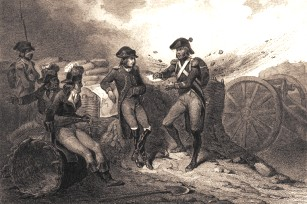Since the beginning of the Revolution, there had been frequent conflicts in Toulon between the workers at the arsenal and the naval officers. Even though their number of officers had be reduced by the emigrations, they had succeeded in taking control of the leadership of the federalist movement in the city and giving it a more and more overt monarchist tone.
The Situation

Enlarge
On July 18, 1793, a Central Committee for Toulon was created. In response to the ongoing events in Paris, it was decided that the Parisian representatives in the city should be arrested. Pierre Baille was caught, but Charles Beauvais and Stanislas Fréron quickly evaded capture.
Soon after, the federalists in Toulon began talks with the English Admiral Samuel Hood who commanded the fleet in the Mediterranean. These negotiations were unsuccessful due to the opposition of moderate federalists from the Gironde who regarded it as treason.
However, the federalists in Marseilles, who had revolted against the Convention on June 22, were now led by a royalist and had created a committee for public safety. They were also alarmed by the military setbacks encountered by their army (which Bonaparte had left when he wrote the caustic Souper de Beaucaire; [Beaucaire Dinner]). Bonaparte was also in the process of sending envoys to the Spanish and British fleets in the hope of obtaining their support against the Convention's troupes.
An English frigate arrived in Marseilles on August 22, 1793 officially to exchange prisoners, but in reality its mission was to restart the talks. Its arrival, coupled with the royalist White Terror sweeping the city and the advancing Republican Armies, solicited a sharp reaction from the local Jacobins. On August 23 and 24, the city streets were the site of violent clashes. The Republican troupes arrived on August 25 with Jean-François Carteaux at their head. They quickly captured Marseilles, renamed the it City-Without-a-Name and returned the Jacobins to authority.
The leaders of the federalist movement barely escaped the ensuing repression by fleeing to Toulon by sea where they continued their discussions with the Spanish and English fleets, now their last resort.
On August 23, the inhabitants of Toulon, with the agreement of Admiral Jean-Honoré de Trogoff, the commander of the French fleet in the city, requested that foreign troupes occupy the city and port. With the arrival of English, Spanish, Sardinian and Neapolitan forces, Louis XVII was proclaimed King, though the English continued to exercise power.
Napoleon Bonaparte's Plan
Once Marseilles had been brought back into the Republican fold, the Revolutionary Army marched on Toulon in order to lay siege to the city. Without a fleet, the Republicans were only able to blockade land routes into the city. The artillery commander, Captain Bonaparte, determined the positions that once captured would make the harbour indefensible for the enemy. His plan turned on capturing the Eguillette and Balaguier, two small forts on the Cairo hill, that controlled the passage between the inner and outer harbour. This would leave the defenders of the city cut off from all supplies.
On September 22, 1793, an uninspired first attack, lead by General Carteaux, failed to reach its objective. The Allies' response was to construct a series of fortifications around the summit of the hill: a large redoubt called Fort Mulgrave and three smaller ones called Saint-Philippe, Saint-Côme and Saint-Charles. This Little Gibraltar, as it was nicknamed by the English sailors, was thought to be unassailable.
Napoleon Bonaparte responded by positioning a large artillery battery, called the Convention, in front of Fort Mulgrave. The main position was supported by smaller batteries located on the surrounding hills. Together, their mission was to repel the enemy fleet during the attack on the fort. Over 300 canons were deployed in total. General Jacques Dugommier, a more competent soldier, took command of the army on November 16. He recognized the genius of Bonaparte's plan and energetically undertook its execution. The Allies, aware of the danger, made a sortie on November 30 and momentarily capture the Convention artillery, but they were pushed back by a counter-attack.
The assault on Little Gibraltar began at midnight on December 16, 1793. The fighting continued throughout the night and Bonaparte himself was injured in the thigh. By dawn, the fort was captured and fortified with artillery to attack the Eguillette and Balaguier. By the end of the next day, all of the forts surrounding Toulon had fallen into the hands of the Republicans either by force or because the British had retreated. After burning the arsenal, the English and Spanish fleets had no other option but to evacuate taking with them around 15,000 of the city's inhabitants. The Convention's army retook Toulon on December 18 and briefly renamed it Port-la-Montagne.
In the days that followed, Paul Barras and Stanislas Fréron directed a bloody repression in which Napoleon Bonaparte did not participate. He had been promoted to Brigadier General on December 22 and was en route to his new assignment as Artillery Commander in the Italian Army.
The Consequences
Besides a sudden and substantial promotion, the Siege of Toulon, and the importance that was later ascribed to it, made Napoleon Bonaparte's celebrity. His name was reported to the Convention for the first time in a letter from Dugommier. He had also met some of his future Grand Officers: Auguste Frédéric Louis Viesse de Marmont, Jean-Andoche Junot, André Masséna, Claude-Victor Perrin and Louis-Gabriel Suchet.